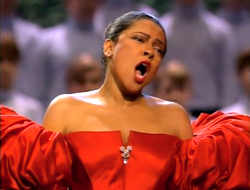 Soprano Kathleen Battle.
Soprano Kathleen Battle. For the last two decades, Battle’s performances have been infrequent – and the reasons why have become the stuff of operatic legend. By all accounts, at the height of her career she was cruel, and she was unusual.
However, it’s unquestionably true that she was publicly fired at the Metropolitan Opera back in 1994 for “unprofessional actions.” At the time, it was widely believed that she would never return to the Met. The following year, a critic in Chicago called her “the most universally despised individual in the world of classical music.”
Yet never never really means never – and it has been announced that next November she will return to the Met to headline a concert called “Underground Railroad: A Spiritual Journey.” Essentially, it will be a similar program to the one she sang on Sunday afternoon at Toronto’s Roy Thomson Hall – except at RTH her supporting vocalists were Toronto’s own Nathaniel Dett Chorale, led by Brainerd Blyden-Taylor. (At the Met, she’ll be appearing with the choir of Harlem’s Abyssinian Baptist Church, led by James Davis, Jr.)
Based on what I saw and heard, Battle, who is now 67, has mellowed over the years. There was no hint of DPD (“Diva Personality Disorder”) behavior in her stage-presence. On the contrary, she was nothing but sweetness and light.
Of course, her voice has mellowed, too – and it’s probably just as well that she didn’t sing any demanding operatic excerpts. Happily, she has retained her trademark purity of timbre and spot-on intonation. And although hers is not a large voice, her sound clearly permeated the hall. So too did her sincere commitment to the repertoire she was singing.
A few of the spirituals were performed in simple, unadorned arrangements that hearkened back to their 19th-century origins. But with the help of Battle’s accompanist, pianist Joel A. Martin, whose playing is rooted in the heyday of jazz, there was a strong mid-20th century sensibility to many selections. If the songs dated back to the Civil War era, musical styles often evoked the Civil Rights movement of the 1960s.
As well, interspersed between musical selections were readings, from the works of Frederick Douglass, Harriet Tubman and Martin Luther King, Jr. – which provided moments of solemnity in a generally joyful celebration in song.
Highlights? Battle’s effortlessly soaring high notes in “Mary Had a Baby,” were arrestingly beautiful. I also enjoyed her coquettish delivery in “Ride Up in the Chariot” – and this particular chariot served as a fine vehicle for some inspired boogie-woogie playing from Martin. As well, “Balm in Gilead,” sung by Battle and a group of women from the choir, was sweetly angelic.
Under Blyden-Taylor, the Nathaniel Dett Chorale sounded rich, fulsome and entirely the equal of the visiting artists on stage. I have heard Blyden-Taylor insist that his professional vocal ensemble is not a gospel choir (because they can do so much more). But here they were an excellent gospel choir.
It was a good thing, on this occasion, that never never means never. Battle’s scheduled return to the Met next November made this concert possible, and Toronto was fortunate to benefit from the rapprochement.
© 2016 Colin Eatock
 RSS Feed
RSS Feed

